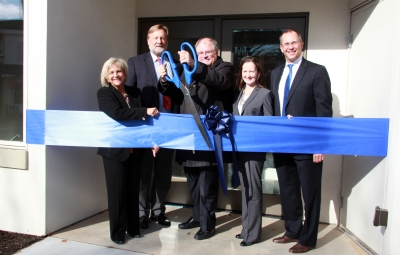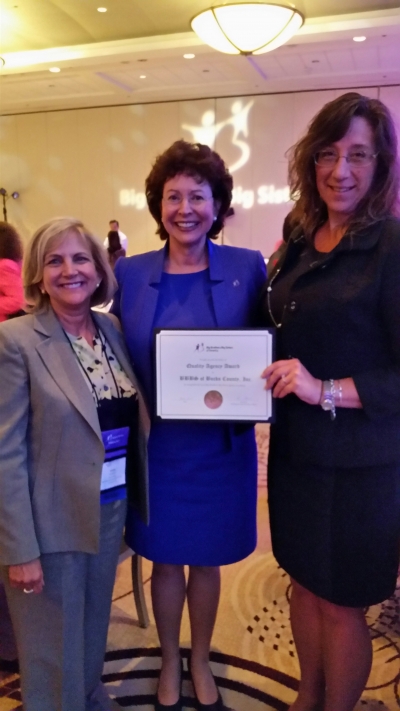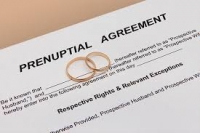Antheil Maslow & MacMinn is very pleased to announce that a new Associate, Gabriel Montemuro, is joining our Litigation and Real Estate and Land Use practice groups. Gabe’s practice focuses on litigation, including commercial litigation, personal injury, estate and employment law. He represents clients regarding business disputes such as contract and employment issues, real estate litigation and fraud claims. Gabe also works with clients to provide assistance with land use and zoning issues such as land development approvals, variances, special exceptions and conditional use approvals. He represents parties in real estate purchases and sales, including agreements of sale, where he guides clients through the process to complete all obligations, responsibilities and contingencies to the agreement and provides oversight during the closing process.
Firm Partners Tom Donnelly and Jessica Pritchard attended Heritage Conservancy's Farm to Table Event at Manoff Market Gardens in New Hope on Saturday, August 6, 2016. Antheil Maslow & MacMinn was proud to be a sponsor of this event. Guests enjoyed a gourmet meal using farm-fresh and locally sourced ingredients. Manoff Market Gardens is an active farm that is situated on a 35 plus acre Heritage Conservancy owned and preserved property. This event highlights the importance of protecting our region's farmland.
You are invited to join us:
When: Sunday, September 11th: 12:30 – 3:00.
What: Antheil Maslow & MacMinn's Annual Client Appreciation BBQ.
Where: AMM's Doylestown Office, 131 West State St. Doylestown.
We hope you’ll join us for some great food and refreshments and enjoy a fun afternoon in the heart of Doylestown! This event includes a BBQ lunch and a front row seat to the Doylestown Arts Festival and Bike Race.
All of our clients and friends are welcome.
Your Client’s Email Account and the Attorney Client Privilege
Written by Thomas P. DonnellyReprinted with permission from the June 24, 2016 issue of The Legal Intelligencer. (c) 2016 ALM Media Properties. Further duplication without permission is prohibited.
The digital age and pervasive use of email communication gives rise to an entirely new and complex set of issues pertaining to the application of the attorney client privilege and the potential claim for waiver of that privilege. Many commentators have addressed the use of commercial email servers and the implications of the terms and conditions applicable to such email accounts citing the potential that emails transmitted through such accounts may not be secure or protected. The commercial provider’s right to use, retain or review the information communicated may impact on the privilege. Even more complex are the issues that arise when email communications pass between a lawyer and a client utilizing an email account provided to the employee by the employee’s employer, or using an employer provided computer. While the law on an employer’s right to review information passing through its computer systems is continuing to develop, the application of that law to potentially attorney client privileged communications is in its infancy. Research regarding the application of attorney client privilege to email communications exchanged through an employer’s email server reveals no case directly on point where the advice of counsel is sought regarding matters involving the employer.
Litigants seeking discovery of attorney client communications through an employer sponsored email account cite the principles developed in cases of inadvertent disclosure and the requirements for invoking the attorney client privilege. Pennsylvania law permits the invocation of the privilege if the communication relates to a fact of which the attorney was informed by his client, without the presence of strangers, for the purpose of securing either an opinion of law, legal services or assistance in a legal matter. Nationwide Mutual Ins. Co. v. Fleming, 924 A.2d 1259 (Pa.Super. 2007). In Carbis Walker, LLPv. Hill Barth and King, LLP, 930 A.2d 573 (Pa.Super.2007), the Superior Court adopted the five factor test to determine whether inadvertent disclosure amounted to a waiver of the attorney client privilege; (1) the reasonableness of the precautions taken to prevent inadvertent disclosure in view of the extent of the document production; (2) the number of inadvertent disclosures;(3) the extent of the disclosure;(4) the delay and measures taken to rectify the disclosure; and (5) whether the overriding interests of justice would or would not be served by relieving the party of its errors.
When your Divorce Decree is issued, there is still work to do!
Written by Elizabeth J. FinemanFew experiences in life are as emotionally challenging as divorce. It is not surprising that clients may focus on the issuance of the Divorce Decree as the end of a very painful chapter in their lives. After all, as of the signing of the Divorce Decree, the parties are divorced, and the work is over. Unfortunately, in most cases, there is still important work to be accomplished even after the judge signs the Divorce Decree. Family law clients will have an easier time accepting this reality if they know in advance that the Divorce Decree is not the last step in their case.
There are many important matters that may remain outstanding when a Divorce Decree is issued, and some of the key factors are discussed here. Most divorce clients resolve the division of their assets by entering into a settlement agreement, or a judge issues an order resolving all claims related to the marriage. Those assets are then typically divided after the Divorce Decree is issued. Bank accounts are divided and closed. If there are retirement accounts to be transferred, there are very specific and time consuming rules to follow to transfer the retirement assets from one spouse or ex-spouse to the other. The retirement assets can take many months to divide which is understandably frustrating for clients. Mortgages on real estate may have to be refinanced and deeds transferred. While these procedures can be time consuming and frustrating to complete, clearly, they are critical to the future financial well-being of the parties involved, so perseverance and patience will pay off in the long run.
After those issues relating to marital property, claims and assets are resolved, there are still some items that we suggest clients accomplish after the Divorce Decree to ensure that they have all the legal documentation completed to address their needs post-divorce. A spouse may want to retake her maiden name. Also, we suggest that Wills and Powers of Attorney be updated so that the ex-spouse is no longer included in the Will or has Power of Attorney. Beneficiary designations should be updated for life insurance policies, retirement accounts and other assets as well. These are merely some of the items that may have to be accomplished post-Divorce Decree.
In order to have realistic expectations of the divorce process, it is important to understand from the start that everything is not finished when the judge signs the Divorce Decree. There is usually more work to be accomplished before the case is completed.
Prenuptial Agreements
A Prenuptial Agreement is simply a practical consideration of the legal and financial issues which should be considered by any couple prior to marriage. If properly drafted, it provides peace of mind that your interests are protected in the event of a divorce. Particularly for individuals or couples who bring significant wealth to the marriage or where one party brings a lot of debt, a premarital agreement isolates those assets and liabilities and streamlines the legal process. In most cases, this is a very positive process which allows both parties to clarify and consider a range of important issues and agree on what actions they should take if certain circumstances occur.
Postnuptial Agreements
A postnuptial agreement is a legal contract signed after a couple enters a civil union or marriage. It dictates how the couple’s financial affairs and assets will be divided in the case of divorce or separation. Postnuptial agreements can spell out the division of all property acquired individually and together from both before and after the marriage. This document can also include details about incurring debts and spousal or child support.
There may be many reasons for married couples to consider a postnuptial agreement. Some of the most common are in cases of second (or third) marriages with children from a previous marriage where parties may want to ensure that some assets go to their children, if one spouse steps out of the workforce to spend a significant amount of time caring for children in order to ensure financial security in the event of a divorce, or in cases where the financial status of either spouse has significantly changed.










